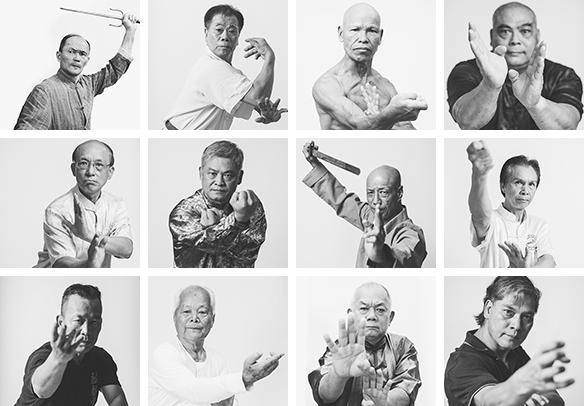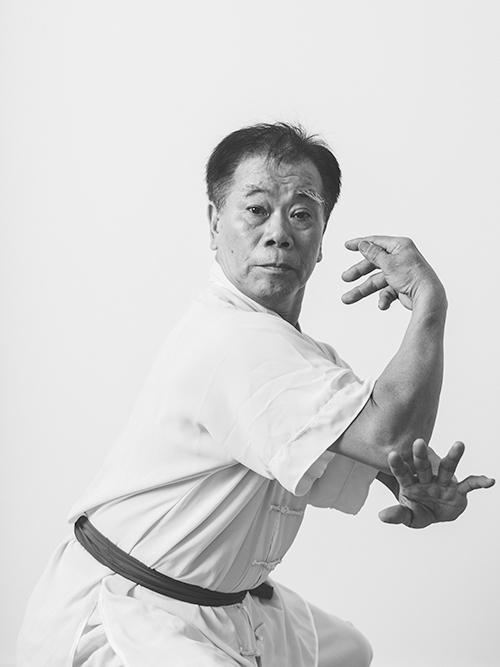Du To Wan, born in 1950, is a Hakka from Guangdong’s Hingning county. Du To Wan’s father ran a furniture business. He was forced into the labour rehabilitation programme during the Cultural Revolution. Du To Wan and his two siblings were thus left in their mother’s sole care. In order to protect his family he trained hard in the martial arts. In 1965 he finished secondary school and left home. In the following years he found employment as a wood-worker and carpenter in various places, including in Fujian and Jiangxi. In 1979 he migrated illegally to Hong Kong, at first working at a garment factory, then in 1990 he opened his own industrial laundry factory, which continues to this day.
刁濤雲,1950年出生,廣東省興寧客家人。刁濤雲的父親經營木材家具生意,民革時期被人抓去勞改(黑五類),家中三兄弟由母親一人照顧。為了不被別人欺負,他努力練功夫保護家人及自己。1965年中學畢業後離家外出工作,曾當木工、傢具,到過福建、江西等地工作。1979年年底偷渡到香港1,最初到工廠當製衣工人,1990年開設工業用洗衣廠經營到現在。
He started kung fu training from around the age of seven. The martial arts he learnt were passed down within his family, and it was forbidden to teach people outside the Du clan in Hingning. Therefore, Du Gar Gau kung fu was practiced only within a few neighbouring villages which share the name surname. Every evening Du To Wan had to wait for the elders to finish kung fu and lion dance training, before he could practice with other village youngers under the elders’ supervision. Usually they had a group of around ten people, and their daily training consisted in kung fu and lion dance training, and “walking the eight immortal table”. Martial arts practice was a form of entertainment to them. Indeed, martial arts were very popular in Meichow’s Hingning area in general, and during Du To Wan’s youth he had many opportunities to acquaint with other local boxing forms such as Chu Gar Gau, Hung Kuen, Li Gar Gau, etc., which his peers in secondary school practiced. He even studied Li Gar Gau with his maternal uncle for a time, as he used to run his own school.
他約七歲開始練習家傳的刁家教4 功夫,由於興寧刁家教功夫不傳外姓人,只可在附近幾個同姓村落傳習,因此每天晚上,刁濤雲需要等待長輩們練功、舞獅(鬥牛獅/客家獅)後,然後才由長輩帶領村中小朋友練。一般十人一起練,功夫、舞獅子、跳八仙桌,每天都練,像日常娛樂一樣。梅州興寧習武風氣盛5,刁濤雲很多機會接觸當地不同的拳術,如朱家教、洪拳、李家教等功夫,中學的同學都有學,李家教甚至跟舅舅練,他的舅舅曾經開設武館。
He was fond of training with the wood dummy (a specialised method of Du Gar Gau’s) and liked to exchange with his brothers. He also followed his elders to nearby Du surname villages to train, and had trained with many elders such as Du Fong Ching. As Du Gar Gau was taught only to members of the Du family, the usual master-disciple relationship did not hold, as younger clan members simply learnt from their uncles and elders. Looking back, Du To Wan said that life was tough back then; all they could afford when visiting clan elders and teachers was to bring some baijiu, and when they did not have enough of that they would pour water into the alcohol. People were content with little. Sadly, many elders who taught martial arts were killed by the red guards during the Cultural Revolution.
他很喜歡打木樁(刁家教特有),喜愛跟兄弟們交流。他亦帶到附近同姓村落去練刁家教,跟過很多長輩學,如刁房正,只要當時看到誰練什麼,就跟誰學。由於練刁家教的都是刁氏族人,因此刁家教沒有嚴格意義上的師傅,主要由叔伯帶著晚輩們練習。據刁濤雲,那時候生活辛苦,探望氏族長者老師時會買點白酒去,酒不夠還往裡面兌水,有點東西已經很高興了。但是文化大革命的時候,很多教功夫的長輩都被紅衛兵4打死了。
In 1979 Du To Wan moved to Hong Kong. At first he worked at a garment factory, then in 1990 he opened his own laundry factory which continues to run today. Du To Wan now lives in a village house in Tai Po. Every morning before sunrise (at 4am) he begins his daily routine, starting with qigong, then he trains with the bean bags (Du Gar Gau has their own specialized training methods), and finally moves on to set practice. He has maintained this routine all these years, training early in the morning before he goes to work.
1979年,刁濤雲到香港生活。最初當製衣工人。1990年在荔枝角開設洗衣廠經營到現在。現在住大埔的村屋,天還沒亮就出來練功了(凌晨4時),先是練氣功,然後綠豆袋(刁家教自成一套的練法),再練套路,到了香港從沒有間斷,每天鍛練,之後又回公司工作。
In 2015 during an ancestor worship ceremony the clan members decided that times had changed and that Chinese martial arts should be taught in a more scientific manner, and should not just focus on the fighting aspect. Moreover, it was necessary to spread Du Gar Gau beyond the clan to prevent it from being lost. Since Du Fo Lung and Du Lung Cheong founded the Du Gar Gau system over a hundred years ago, Du To Wan is now the fourth generation lineage holder. Individuals from the previous two generations had used kung fu for their own gain and brought shame to the whole clan. This led to the decision of not teaching Du Gar Gau to non-clan members and the closing of all Du Gar Gau schools. The time had come to reverse this policy.
2015年,回鄉祭祖時,鄉親們認為現在時代改變了,講求科學,中國功夫文化也不能只講打打殺殺,而應該要發揚出去,以免失傳。一百多年前自刁火龍、刁龍昌兩兄弟確定刁家教的系統後,刁濤雲是第四代傳人了。可惜上兩輩因有徒弟利用功夫欺詐,有辱刁氏的名聲,族人決定功夫不准外傳,當時所有刁家教武館解散了。
In the same year, with his clan’s support, Du To Wan started Du Gar Gau Guoshu Association, and for a short while held classes at Tsuen Wan Kai fong Welfare Association together with Kwongsai Bamboo Forest Temple Praying Mantis ’s Du Kwok Cheong. Subsequently, he opened a school at his own laundry factory. He now has over ten students, all of whom joined through friends’ recommendation.
同年,刁濤雲為了發揚刁家教功夫及在鄉親支持下,在香港成立了刁家教國術會,曾短時間與江西竹林寺螳螂刁國昌一起於荃灣街坊福利會授武。後來在自己的洗衣工場內開設了武館。現時共有十多位學生,都是經朋友介紹來學的,正處於起步。





